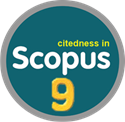Accounting Students' Perceptions regarding Accounting Fraudulent Actions
Abstract
The accounting profession must be carried out with a professional attitude that is fully based on existing moral and ethical standards so that it is able to face pressures that arise from oneself and from other parties, where a person's ability to understand and be sensitive to ethical issues is also greatly influenced by the environment in which they live. he is. In this case, one factor that can influence an accountant's behavior is the world of education. This research was carried out by survey using primary data from respondents who filled in questionnaires distributed to 140 accounting students from the class of 2019 using a simple random sampling technique. The data obtained was then processed using statistics as an analytical tool to test the proposed hypothesis, namely to find out whether there were differences in perceptions between male and female accounting students at UPN Veteran East Java regarding acts of accounting fraud, and analyzed using Independent Sample t-test analysis. The analysis results concluded no difference in perception between male and female accounting students regarding acts of accounting fraud by looking at the t-count of 0.129 with a significance level of 0.898, greater than 5%. Thus, the hypothesis proposed by the researcher was not proven true. The small sample and scope of the student may have caused this result. Therefore, future research may study a large sample with different backgrounds. This research contributes significantly to the literature on accounting fraud and provides valuable insights for practitioners, educators, and policymakers in the accounting field.
Downloads
References
Abouzeedan, A., & Hedner, T. (2012). Organization structure theories and open innovation paradigm. World Journal of Science, Technology and Sustainable Development, 9(1), 6–27. https://doi.org/10.1108/20425941211223598
Administrator. (2020). Upaya Mendeteksi Kecurangan Fraud. Inspektorat Kabupaten Way Kanan. https://inspektorat.waykanankab.go.id/detailpost/upaya-mendeteksi-kecurangan-fraud
Chotimah, C., & Kartika, A. (2017). Pengaruh Gender, Tekanan Ketaatan, Kompleksitas Tugas, dan Pengalaman Auditor terhadap Audit Judgment. Dinamika Akuntansi Keuangan & Perbankan, 6(1), 1–15. https://www.unisbank.ac.id/ojs/index.php/fe9/article/view/5950
Friscilla, Y., & Nugroho, P. I. (2020). Love of Money, Machiavellian dan Persepsi Etis : Analisis Berdasarkan Perspektif Gender. Jurnal Akuntansi Profesi, 11(2), 223–234. https://ejournal.undiksha.ac.id/index.php/JAP/article/view/29928
Ghozali, I. (2018). Aplikasi Analisis Multivariate Dengan Program IBM SPSS 25 (9th ed.). Badan Penerbit Universitas Diponegoro.
Handayani, M. M., Ratnawati, S., & Helmi, A. F. (2015). Efektifitas Pelatihan Pengenalan Diri terhadap Peningkatan Penerimaan Diri dan Harga Diri. Jurnal Psikologi, 25(2), 47–55. https://journal.ugm.ac.id/jpsi/article/view/7504
Hutahahean, M. U. B., & Hasnawati, H. (2015). Pengaruh Gender, Religiusitas dan Prestasi Belajar terhadap Perilaku Etis Akuntan Masa Depan (Studi pada Mahasiswa Akuntansi Perguruan Tinggi Swasta di Wilayah DKI Jakarta). E-Journal Akuntansi Trisakti, 2(1), 49–66. https://e-journal.trisakti.ac.id/index.php/jat/article/view/4831
Indriana TL, D., Widowati, A. I., & Surjawati, S. (2017). Faktor-Faktor Yang Mempengaruhi Prestasi Akademik: Studi Kasus Pada Mahasiswa Program Studi Akuntansi Universitas Semarang. Jurnal Dinamika Sosial Budaya, 18(1), 38–48. https://doi.org/10.26623/jdsb.v18i1.557
Isgiyata, J., Indayani, I., & Budiyoni, E. (2018). Studi Tentang Teori GONE dan Pengaruhnya Terhadap Fraud Dengan Idealisme Pimpinan Sebagai Variabel Moderasi: Studi Pada Pengadaan Barang/Jasa di Pemerintahan. Jurnal Dinamika Akuntansi Dan Bisnis, 5(1), 31–42. https://doi.org/10.24815/jdab.v5i1.8253
Ismatullah, I., & Eriswanto, E. (2016). Analisa Pengaruh Teori Gone Fraud terhadap Academic Fraud di Universitas Muhammadiyah Sukabumi. Riset Akuntansi Dan Keuangan Indonesia, 1(2), 134–142. https://doi.org/10.23917/reaksi.v1i2.2731
Listalia, D., & Suryaningrum, D. H. (2023). Implementation of Audit Procedures for Inventory Accounts at the Melati Putih Health Center. Sustainable Business Accounting and Management Review, 5(2), 1–13. https://doi.org/10.61656/sbamr.v5i2.71
Mauludy, M. I. A., Hikmah, E. latiffatul, & Putri, C. N. P. (2017). Analisis Kasus Pelanggaran Standar Profesional Akuntan Publik oleh KAP Winata. Prosiding Seminar Nasional dan Call for Paper Ekonomi Dan Bisnis (SNAPER-EBIS 2017) –Jember,27-28 Oktober 2017 Fakultas Ekonomi dan Bisnis Universitas Jember - UNEJ e-Proceeding, 196–201. https://jurnal.unej.ac.id/index.php/prosiding/article/view/6704
Nofianti, L. (2012). Kajian Filosofis Akuntansi: Seni, Ilmu atau Teknologi. Pekbis Jurnal, 4(3), 203–210. https://pekbis.ejournal.unri.ac.id/index.php/JPEB/article/view/1474/0
Nurharjanti, N. N. (2017). Persepsi Mahasiswa dalam Mengurangi Fraud Akademik: Whistleblowing Sistem. Jurnal Akuntansi Dan Bisnis, 17(1), 1–12. https://doi.org/10.20961/jab.v17i1.218
Őnday, Ő. (2016). Organization Culture Theory: From Organizational Culture of Schein to Appreciative Inquiry of Cooperrider & Whitney. Elixir Org. Behaviour, 92, 39002–39008. https://www.elixirpublishers.com/articles/1677326509_201603055.pdf
Pasaribu, P. Y., & Briando, B. (2019). Internalisasi Nilai-Nilai Pancasila dalam Penyusunan Kode Etik Aparatur Pengawas Internal Pemerintah (APIP). Jurnal Ilmiah Kebijakan Hukum, 13(2), 245–264. https://doi.org/10.30641/kebijakan.2019.V13.245-264
Pratama, B. (2022). Impresi Pengendalian Internal, Persepsi Kesesuaian Kompensasi, dan Ketaatan pada Aturan Akuntansi terhadap Kecenderungan Kecurangan Akuntansi. Jurnal Economia, 1(1), 35–48. https://doi.org/10.55681/economina.v1i1.16
Ratri, M. C., & Bernawati, Y. (2020). Penerapan Standar Profesional Audit Internal dan Kualitas Audit: Sebuah Tinjauan Literatur. Jurnal Bisnis dan Akuntansi, 22(1), 47–56. https://doi.org/10.34208/jba.v22i1.605
Romadhon, F., & Diamastuti, E. (2020). Kepatuhan Pajak: Sebuah Analisis Teoritis Berdasarkan Perspektif Teori Atribusi. Jurnal Ilmiah ESAI, 14(1), 17–35. https://doi.org/10.25181/esai.v14i1.2382
Schroeder, R. G., Clark, M. W., & Cathey, J. M. (2022). Financial Accounting Theory and Analysis: Text and Cases. USA: Wiley.
Soedradjat, S. B., & Suryaningrum, D. H. (2022). Efek Gender, Kesulitan Akuntansi, Peluang Karir dan Sindrom Impostor terhadap Keputusan Mahasiswa Memilih Jurusan Akuntansi. Jurnal Pendidikan Akuntansi Indonesia, 20(1), 39–51. https://doi.org/10.21831/jpai.v20i1.47519
Sofia, K. (2022). The Effect of Auditor Gender on Audit Judgement. International Journal Management Science and Business, 4(2), 139–148. https://ejournal.upi.edu/index.php/msb/article/view/59857
Sugiyono. (2018). Metode Penelitian Kuantitatif, Kualitatif, dan R&D (3rd ed.). Bandung: Alfabeta.
Suryaningrum, D. H. (2019). Power and Knowledge of Double Entry Bookkeeping System in the Feminism Framework: A Proposal. Sustainable Business Accounting and Management Review, 1(1), 19–30. https://doi.org/10.61656/sbamr.v1i1.25
Suryaningrum, D. H., Hastuti, S., & Suhartini, D. (2013). Accounting Students and Lecturers Ethical Behavior: Evidence from Indonesia. In Business Education & Accreditation (Vol. 5, Issue 1). https://papers.ssrn.com/sol3/papers.cfm?abstract_id=2155085
Suryaningrum, D. H., Subroto, B., & Rahman, A. F. (2015). Empirical Analysis of Ethics Integration and Online Learning in Auditing Course on Ethical Decision Making: Further Evidence from Indonesia. Journal of Advance Research in Business Management and Accounting (ISSN: 2456-3544), 1(1), 150–173. https://doi.org/10.53555/nnbma.v1i1.153
Susilowati, E., Suryaningrum, D. H., & Andayani, S. (2023). Gender And XYZ Generations Perspective on Academic Misconduct: Evidence From Indonesia. Journal of Namibian Studies, 33(Special Issue 1), 1416–1438. https://namibian-studies.com/index.php/JNS/article/view/2907
Thoyibatun, S. (2018). Faktor-Faktor yang Berpengaruh terhadap Perilaku Tidak Etis dan Kecenderungan Kecurangan Akuntansi serta Akibatnya terhadap Kinerja Organisasi. EKUITAS (Jurnal Ekonomi Dan Keuangan), 16(2), 245–260. https://doi.org/10.24034/j25485024.y2012.v16.i2.223
Copyright (c) 2024 Sjarief Hidajat

This work is licensed under a Creative Commons Attribution 4.0 International License.














